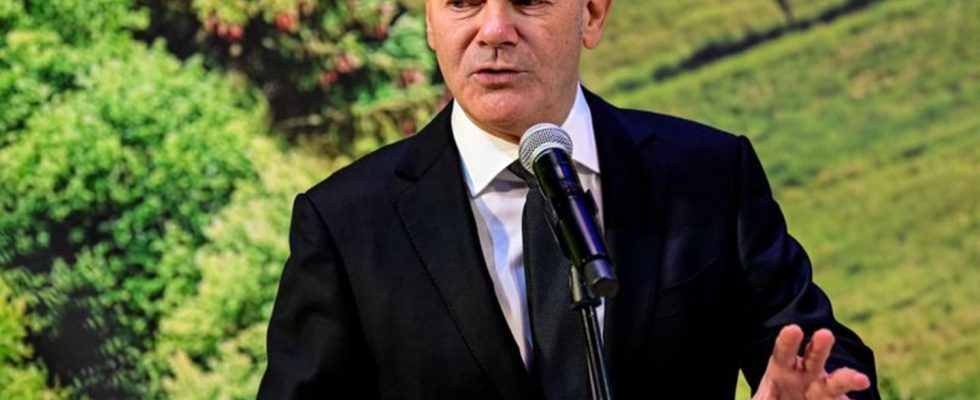Agricultural
Scholz talks to the Commission about easing the burden on farmers
Olaf Scholz is now inviting the Future Commission for Agriculture, which was set up by his predecessor Angela Merkel, to an exchange. photo
© Fabian Sommer/dpa
The big tractor demonstrations against subsidy cuts are over for the time being. In order to accommodate the farmers, the coalition has promised relief. Are they getting going now?
After weeks of nationwide farmers’ protests, Chancellor comes Olaf Scholz (SPD) met today with the government commission on the future of agriculture. After anger over the cancellation of agricultural diesel benefits, the conversation will focus on possible other relief for the industry. The government coalition has, among other things, promised relief in bureaucratic requirements and tax regulations, which are to be implemented before the summer.
Larger groups in the Chancellery are usually more likely to come together when it comes to the automotive industry, for example. Scholz is now inviting the Agriculture Future Commission, which was set up by his predecessor Angela Merkel (CDU), to an exchange. It is not a business interest group. Rather, it includes representatives from farmers and the food industry, nature conservation, animal and consumer protection, trade and science. The broad committee brought about a kind of agricultural peace in 2021 – with recommendations for a major restructuring of the food system as a “task for society as a whole”.
The traffic light coalition has been trying to appease farmers for weeks after it sparked outrage in many villages with an abrupt announcement of the end to long-standing tax breaks for diesel at the turn of the year. The changed plans, which provide for abolition in stages, are now a done deal. The coalition right up to the Chancellor has promised farmers relief elsewhere as compensation. Some concrete steps for implementation are still pending. An overview of the catalog:
Areas
Agriculture Minister Cem Özdemir (Greens) is implementing relaxed EU environmental regulations. Accordingly, in 2024 farms will no longer be required to leave four percent of arable land fallow or use it unproductively. The government is committed to ensuring that this remains the case for the next few years and does not have to be decided again every year.
Steer
The aim is to make it easier for farmers to make high profits one year and not the next because of the weather. As a result, they pay high taxes in good years and rise in percentage terms in the progression curve, as Finance Minister Christian Lindner (FDP) explained. This should be able to be “smoothed out” over several years.
Market position
There will soon be regulations that will strengthen the position of farmers in the retail chain right up to the large supermarkets. Among other things, better market and price monitoring is planned as a basis for farmers’ sales decisions.
Technologies
The government wants to examine how the use of alternative drives in agriculture can advance – including through tax relief for fuels.
bureaucracy
The focus is on a range of simplifications in terms of requirements and specifications, such as documentation and record-keeping obligations for animal owners or fertilizer regulations.
livestock farming
As announced, the new animal husbandry logo for pork in supermarkets is to be extended to the catering industry. To this end, the government is holding out the prospect of an “examination” of how long-term, reliable financing can be ensured for converting the entire animal husbandry system to higher standards. With an advertising offensive for an “animal welfare cent,” Özdemir has been sidelined by the coalition for the time being.
Subsidies
The government wants to develop proposals for the future direction of EU agricultural financing worth billions – the final report of the “Future Commission” is a good basis for this. Among other things, the committee recommended a stronger commitment to environmental regulations. It is estimated that a total of seven billion to eleven billion euros in additional costs will be due per year, the report said: for example for more organic farming, a partial waiver of pesticides and the conversion of stables.

